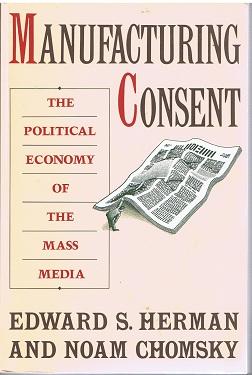
Manufacturing Consent
Manufacturing Consent: The Political Economy of the Mass Media is a 1988 book by Edward S. Herman and Noam Chomsky. It argues that the mass communication media of the U.S. "are effective and powerful ideological institutions that carry out a system-supportive propaganda function, by reliance on market forces, internalized assumptions, and self-censorship, and without overt coercion", by means of the propaganda model of communication.[1] The title refers to consent of the governed, and derives from the phrase "the manufacture of consent" used by Walter Lippmann in Public Opinion (1922).[2] The book was honored with the Orwell Award.
For other uses, see Manufacturing Consent (disambiguation).Authors
United States
English
1988
381/.4530223 21
P96.E25 H47 2002
A 2002 revision takes account of developments such as the fall of the Soviet Union. A 2009 interview with the authors notes the effects of the internet on the propaganda model.[3]
Background[edit]
Origins[edit]
Chomsky credits the impetus of Manufacturing Consent to Alex Carey, the Australian social psychologist, to whom the book is dedicated.[4] The book was greatly inspired by Herman's earlier financial research.
Authorship[edit]
Herman was a professor of finance at Wharton School at the University of Pennsylvania,[5] and Chomsky is a linguist and activist scholar, who has written many other books, such as Towards a New Cold War.[5] Before Manufacturing Consent was published in 1988, the two authors had previously collaborated on the same subject. Their book Counter-Revolutionary Violence: Bloodbaths in Fact & Propaganda, a book about American foreign policy and the media, was published in 1973. The publisher for the book, a subsidiary of Warner Communications Incorporated, was deliberately put out of print after publishing 20,000 copies of the book, most of which were destroyed, so the book was not widely known.[6]
According to Chomsky, "most of the book [Manufacturing Consent]" was the work of Edward S. Herman[7].[8]: 8 Herman describes a rough division of labor in preparing the book whereby he was responsible for the preface and chapters 1–4 while Chomsky was responsible for chapters 5–7.[8]: 204 According to Herman, the propaganda model described in the book was originally his idea, tracing it back to his 1981 book Corporate Control, Corporate Power.[8]: 205 The main elements of the propaganda model (though not so-called at the time) were discussed briefly in volume 1 chapter 2 of Herman and Chomsky's 1979 book The Political Economy of Human Rights, where they argued, "Especially where the issues involve substantial U.S. economic and political interests and relationships with friendly or hostile states, the mass media usually function much in the manner of state propaganda agencies."[9]
Documentary adaptation[edit]
The 1992 documentary film Manufacturing Consent: Noam Chomsky and the Media directed by Mark Achbar and Peter Wintonick first opened at the Film Forum. This three-hour adaptation considers the propaganda model of communication and the politics of the mass-communications business, with emphasis on Chomsky's ideas and career.[20]